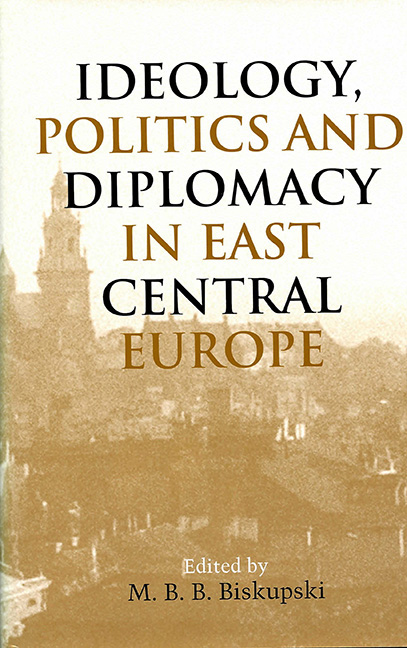Book contents
- Frontmatter
- Contents
- Preface
- Tabula Honoraria
- Piotr Wandycz
- Piotr Wandycz: An Appreciation
- 1 A Comparison of Czech Politics in Bohemia with Czech Politics in Moravia, 1860–1914
- 2 Strategy, Politics, and Suffering: The Wartime Relief of Belgium, Serbia, and Poland, 1914–1918
- 3 “This Troublesome Question”: The United States and the “Polish Pogroms” of 1918–1919
- 4 The Socialist Imprint on International Relations in Interwar Europe
- 5 Hungarian Americans during World War II: Their Role in Defending Hungary's Interests
- 6 The Nazi-Soviet Pact of August 23, 1939: When Did Stalin Decide to Align with Hitler, and Was Poland the Culprit?
- 7 Poland, the GDR, and the “Ulbricht Doctrine”
- Writings of Piotr S. Wandycz
- Contributors
- Index
Preface
Published online by Cambridge University Press: 11 May 2017
- Frontmatter
- Contents
- Preface
- Tabula Honoraria
- Piotr Wandycz
- Piotr Wandycz: An Appreciation
- 1 A Comparison of Czech Politics in Bohemia with Czech Politics in Moravia, 1860–1914
- 2 Strategy, Politics, and Suffering: The Wartime Relief of Belgium, Serbia, and Poland, 1914–1918
- 3 “This Troublesome Question”: The United States and the “Polish Pogroms” of 1918–1919
- 4 The Socialist Imprint on International Relations in Interwar Europe
- 5 Hungarian Americans during World War II: Their Role in Defending Hungary's Interests
- 6 The Nazi-Soviet Pact of August 23, 1939: When Did Stalin Decide to Align with Hitler, and Was Poland the Culprit?
- 7 Poland, the GDR, and the “Ulbricht Doctrine”
- Writings of Piotr S. Wandycz
- Contributors
- Index
Summary
All students of the history of Central Europe are in the debt of Piotr Stefan Wandycz, who has recently retired from his position as Bradford Durfee Professor of History at Yale University. Retirement has not slowed Professor Wandycz's activities, but rather has refocused them. His scholarly production has somehow increased with the passage of years and continues at a prodigious rate. He has of late become the president of the Polish Institute of Arts and Sciences in America, and has launched bold initiatives to steer that venerable institution in new directions that reflect the tremendous changes brought about by the restoration of freedom to much of Europe.
As a small gesture of recognition for his long and varied contributions to history, we who had the honor of earning our doctorates under his tutelage have brought together this collection of essays, which is dedicated to a man we admire as a scholar, mentor, and colleague. These studies focus on many of the areas traditionally addressed by Wandycz, reflecting his fascination with politics and international relations. Wandcyz has striven, with unmatched success, to make the history of East Central Europe—here understood principally as the historic lands of the Poles, Hungarians, Czechs, and Slovaks—comprehensible to the English-speaking scholarly world. His method has been to link these nations to the major events and problems of European history in general, thereby expanding and making more coherent the story of the continent and the world.
Piotr's direct contributions to the historiography of East Central Europe are very large indeed. Indirectly, however, his contributions may well prove yet more considerable. His many students, guided by his early counsel and inspired by his continuing accomplishments, have themselves collectively produced a significant body of worthy scholarship that is increasing exponentially as the students of the students of Wandycz are now entering the academic world.
This volume consists of a “Tabula Honoraria,” in which many scholars from around the world have joined to pay tribute to one of the most illustrious members of their company. Antony Polonsky has graciously consented to write what follows, an introductory appreciation of Piotr Wandycz's extraordinary career.
- Type
- Chapter
- Information
- Ideology, Politics, and Diplomacy in East Central Europe , pp. vii - viiiPublisher: Boydell & BrewerPrint publication year: 2003

